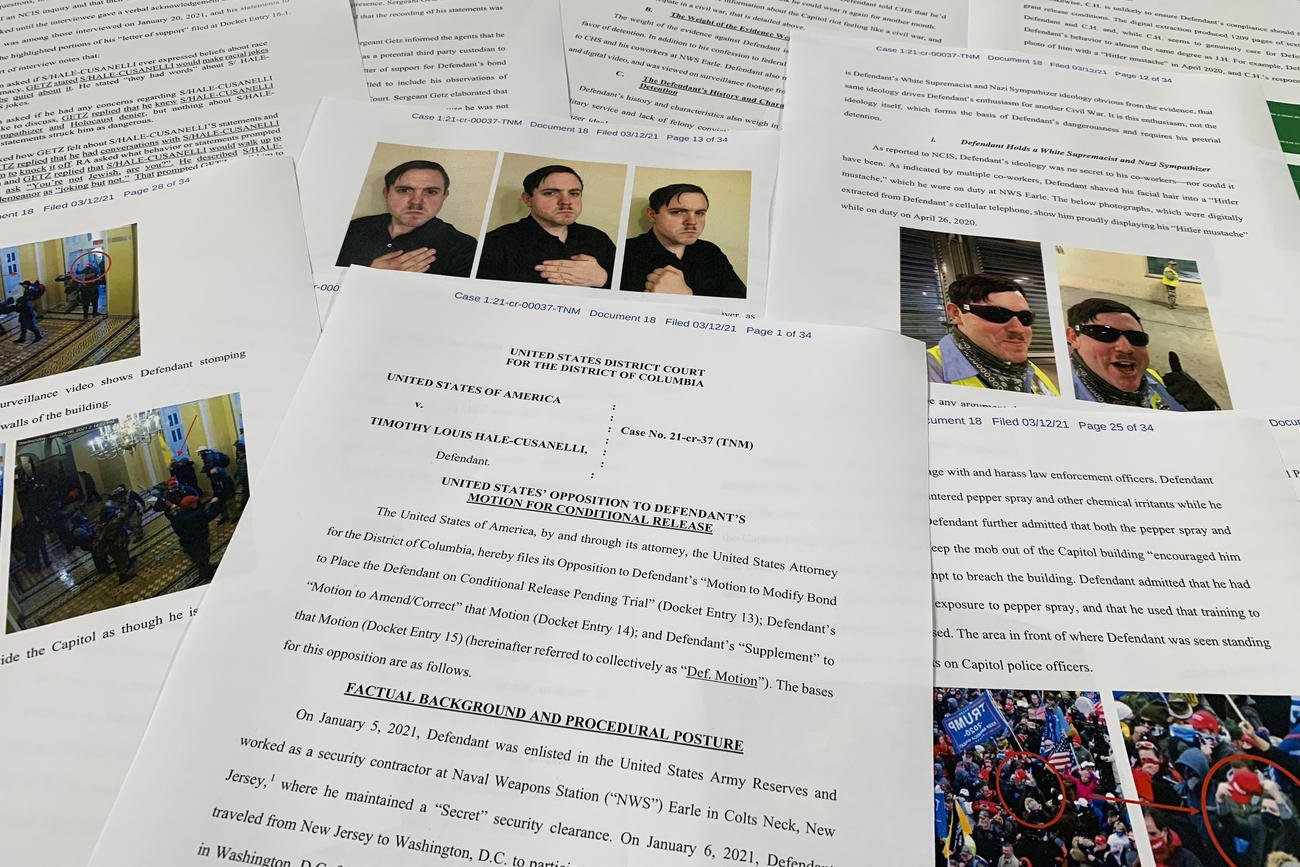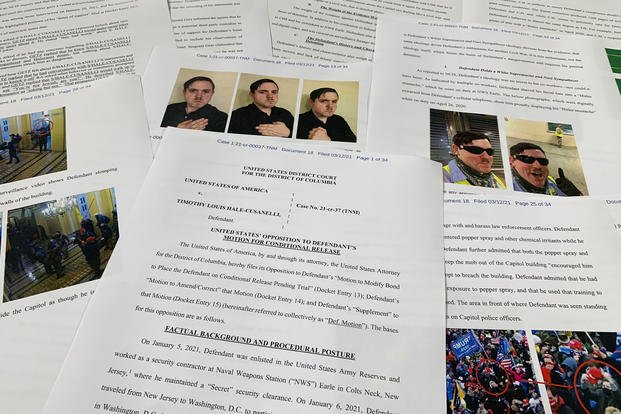

WASHINGTON (AP) — A former U.S. Army reservist described by prosecutors as a Nazi sympathizer was convicted Friday of storming the U.S. Capitol to obstruct Congress from certifying President Joe Biden’s 2020 electoral victory.
Timothy Hale-Cusanelli, who worked a security contractor at a Navy base when he joined the pro-Trump mob on Jan. 6, was also convicted of disorderly conduct and other misdemeanors.
Hale-Cussanelli took the stand in his defense and claimed he didn’t know that Congress met at the Capitol building.
“I know this sounds idiotic, but I’m from New Jersey,” Hale-Cusanelli said, according to WUSA-TV. “In all my studies, I didn’t know there was an actual building that was called the ‘Capitol.’ It’s embarrassing and idiotic.”
Hale-Cusanelli’s trial was the fifth before a jury and the seventh overall for a Capitol riot case. The first four juries unanimously convicted the riot defendants of all charges. Roughly 300 others have pleaded guilty to crimes stemming from the riot, including seditious conspiracy and assault.
Prosecutors said Hale-Cusanelli openly espoused white supremacist and antisemitic ideology and wore an Adolf Hitler-style mustache to work. On his cellphone, investigators found photos of him with the distinctive mustache and combed-over hairstyle associated with the Nazi leader.
Hale-Cusanelli had a “secret” security clearance for his job as a security contractor at Naval Weapons Station Earle in Colts Neck, New Jersey. He also lived on the base with a roommate who reported him to the Naval Criminal Investigation Service and secretly recorded a conversion about the Capitol riot.
During the trial’s opening statements Tuesday, a Justice Department prosecutor said Hale-Cusanelli stormed the Capitol because he wanted to kick off a civil war and create “a clean slate.”
Defense attorney Jonathan Crisp told jurors that “groupthink” and a desperate desire “to be heard” drove Hale-Cusanelli to follow a mob into the Capitol. Crisp described Hale-Cusanelli as a bombastic agitator prone to making “extreme statements to get attention.”
In pretrial court filings, prosecutors framed Hale-Cusanelli’s bigoted, antisemitic views as motivating factors for his participation in the Jan. 6 riot and his desire for a civil war.
One Navy seaman said Hale-Cusanelli told him “he would kill all the Jews and eat them for breakfast, lunch, and dinner, and he wouldn’t need to season them because the salt from their tears would make it flavorful enough,” according to prosecutors. Other coworkers recalled Hale-Cusanelli making derogatory remarks about women, Black people and other minorities, prosecutors said.
Before the trial, Crisp argued that any testimony about Hale-Cusanelli’s alleged statements about Jewish people and their role in the U.S. government would be “highly prejudicial in nature without substantive value.”
Crisp acknowledged Hale-Cusanelli shouldn’t have entered the Capitol building.
“But the question of why he was there is what is important,” he told jurors Tuesday.
Hale-Cusanelli wasn’t charged with engaging in any violence or property destruction. He was indicted on five counts: obstruction of an official proceeding, entering or remaining in a restricted building or grounds, disorderly or destructive conduct in a restricted building or grounds, disorderly conduct in a Capitol building, and parading, demonstrating or picketing in a Capitol building.
The obstruction charge is a felony. The rest are misdemeanors.
Crisp said Hale-Cusanelli believed then-President Donald Trump’s false claims about a stolen election. But the defense attorney said Hale-Cusanelli went to Washington to peacefully protest, wearing a suit while many others wore tactical gear.
A video captured Hale-Cusanelli yelling profanities at police officers and screaming, “The revolution will be televised!”
“This was not a peaceful protest,” Assistant U.S. Attorney Kathryn Fifield said.
More than 800 people have been charged with Capitol crimes stemming from the riot. Many of then are military veterans. Hale-Cusanelli is among a few defendants who were on active duty on Jan. 6.
U.S. District Judge Trevor McFadden, who presided over Hale-Cusanelli’s trial, decided two other Capitol riot cases after hearing testimony without a jury. McFadden acquitted one of the defendants of all charges and partially acquitted the other after bench trials.
Hale-Cusanelli was arrested less than two weeks after the attack and has remained jailed since February 2021. He was discharged from the U.S. Army Reserves and barred from the Navy base after his arrest.
© Copyright 2022 Associated Press. All rights reserved. This material may not be published, broadcast, rewritten or redistributed.
